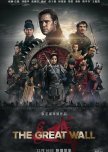Esta resenha pode conter spoilers
Which promotional poster is more appealing? Personally, the Chinese one with actors others than Matt Damon featured is a film I would go see.
In its attempts to appeal and draw in a Western audience, The Great Wall kind of shot itself in the foot. Its main mistake was marketing the film as Matt Damon’s The Great Wall, because really, it was not. When the Matt Damon-centric trailers and the promotional posters with his giantass face on them came out, the criticisms started pouring in, calling it whitewashing and promoting a white savior narrative. With the materials and evidence we were given at that time, the criticisms rang true and stung, especially when left and right we were hearing of whitewashing films (Ghost in the Shell, Aloha, Gods of Egypt, Doctor Strange, Death Note, etc) and a general lack of Asian-American representation in Hollywood - once bitten, twice shy, I suppose. Marketing The Great Wall by using its main foreign actor to draw in viewers outside China came at maybe too high a price. It brought with it talks of boycott and just a general hate for the film from the Asian-American community, myself included, which undoubtedly must have hurt its performance at the box office (Wikipedia states it lost money). I’ve recently seen the film at last - I was curious and found out Andy Lau was in it (which I wouldn’t have gotten from the English poster) - and thought a lot of the criticisms were unfounded.
One of the first questions raised about the film was why were there Europeans in a film set in ancient China, and a logical explanation was given for that. The Europeans were in ancient China because they were being their warmonger, greedy-ass self and were looking for the mysterious black powder (gunpowder). *spoilers* And they all failed and died except for the main characters, and the Chinese Army retained their secret in the end. *spoilers* The explanation given for the presence of Europeans in China was doable. Since the director stated that Matt Damon’s character William was not written for an Asian actor, that also answered the whitewashing question.
The next big question then was the white savior narrative, which I can say after seeing the film that it’s not true. Matt Damon’s character William might have lent a hand to his Chinese allies and unknowingly provided them with information they were able to make use of, but it was Strategist and War Counselor Wang, Commander-turned-General Lin Mae, and Peng Yong who were the saviors. William was more of an observer who occasionally helped out because it was either that or die. In fact, when William tried to make the final kill shot, so to speak, that would banish the evil and save everyone, he tried and failed. General Lin Mae, who stated “excuse me, I’m the one trained for this my whole life,” was the one who saved the day, not Matt Damon’s character. Did the film appeared like it was from Matt Damon’s/an outsider’s point of view? Yes, it was, likely a conscious decision to draw in a Western audience and introduce them to the Chinese actors and culture. But was it a white savior narrative? In my opinion, no, it wasn’t.
The Great Wall was a visually pleasing, action film with a strong female heroine at its center and a decent cast of character. The crux of the problem was that in trying to break into Western and American markets, promotions were solely focused on Matt Damon, which didn’t do it any favors. The Great Wall didn’t have any Chinese big names that Western audience was familiar enough with. It had Andy Lau, which, I’d say, would be enough to draw in any Asian audience (I could be wrong about this, but he was enough to draw me in), Western audience might or might not remember him from 2004’s House of Flying Daggers, which was nominated for an Academy Award for Best Cinematography. While Andy Lau is well known in Asia, he isn’t a name like Jackie Chan or Jet Li, or even Donnie Yen, not Asian-Americans but Chinese actors who already broke into Hollywood that American audience will recognize and go see in theaters. Having his name alongside Matt Damon’s on promotional posters wouldn’t have hurt though. Or even an “introducing Jing Tian to American audience” for our heroine would have made it 100 times better than just Matt Damon’s The Great Wall.
The Great Wall has kind of the same vibe as Jackie Chan’s Dragon Blade with John Cusack, a mixture of Chinese and Western characters with the setting in China. Unfortunately for The Great Wall, it didn’t have Jackie Chan. Jackie Chan’s Dragon Blade did well, and it wasn’t really targeted or marketed to Western audience so you might not have even heard of it. It wasn’t wrapped in controversies or have the question of why were there Romans in China aimed at it. If it had been marketed to a Western audience, I believe it wouldn’t have made big, upsetting news either. It would have probably been seen as a collaboration between Jackie Chan and John Cusack, and it would have done fine and everyone would have gone about their day like normal. Unfortunately for The Great Wall, to American audience, it was Matt Damon’s The Great Wall because it was marketed as such. In attempting to be appealing, it unknowingly repel the very audience it was trying to draw in and a decent film didn’t get the recognition it deserved.
So in conclusion, watch The Great Wall. Just don’t think of it as Matt Damon’s The Great Wall and you’ll be okay.
Esta resenha foi útil para você?

























